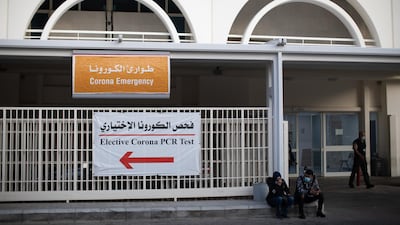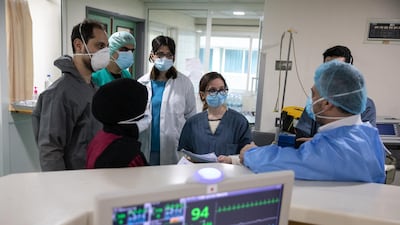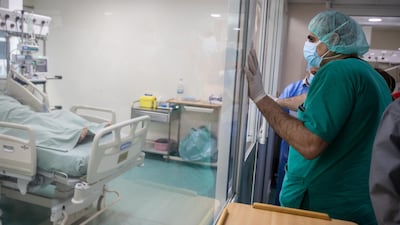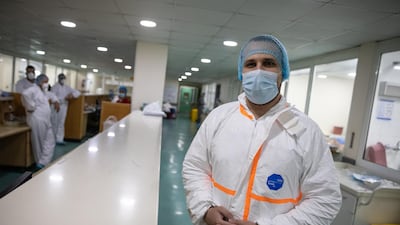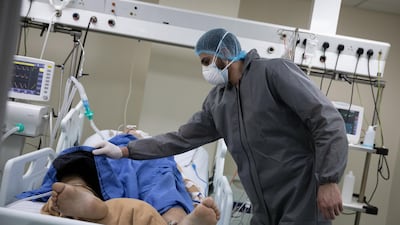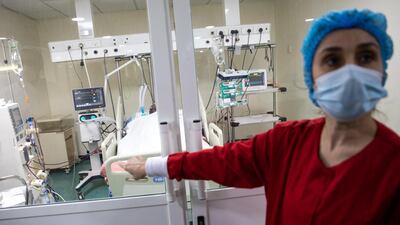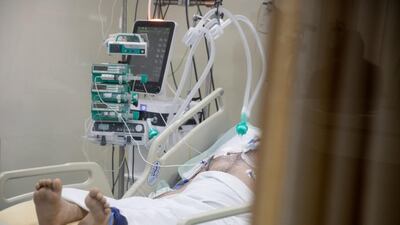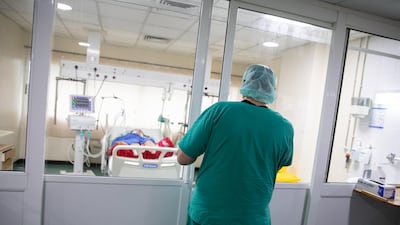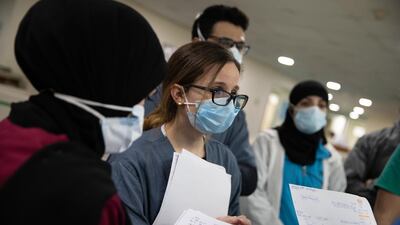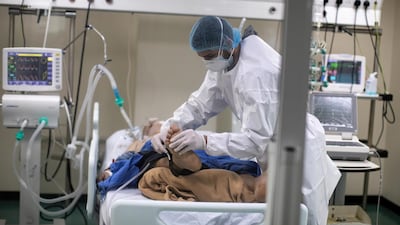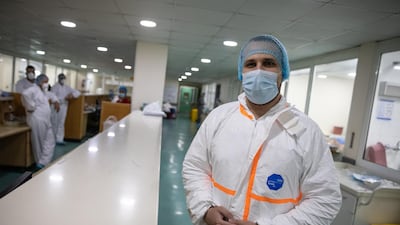After an agonising year fighting Covid-19, Lebanon’s healthcare system can at last see light at the end of the tunnel.
Healthcare workers are days away from being vaccinated against "one of the cruellest diseases they've ever treated", said Eveline Hitti, chairwoman of the department of emergency medicine at the American University of Beirut Medical Centre.
More than 28,000 doses of the Pfizer-BioNTech vaccine arrived on Saturday. More batches will follow this month and later in the year. In all, 2.1 million doses are expected.
“First doses will start on Sunday in limited numbers and will expand on Monday to several centres all over Lebanon,” said Abdul Rahman Bizri, head of Lebanon’s national coronavirus committee. They will be administered with priority given to health workers and high-risk groups as a start, he said.
The initial vaccination drive will include 20 centres at private and public hospitals in areas including Beirut, Byblos, Zahle, Saida, Nabatieh and Tripoli.
To preserve the Pfizer-BioNTech vaccine, at minus 70°C, 13 ultra-low thermal freezers and 12 compatible vehicles were secured in hospitals for safe storage and transportation.
The process at each centre is divided into three phases: registration, vaccination and observation, which should take about 35 minutes, according to the state’s strategy.
Initially, the goal is to vaccinate 500 people a day, said Firas Abiad, manager of Beirut’s public Rafik Hariri University Hospital. The hospital received the very first reported Covid-19 patient in Lebanon in February 2020 and will be the first to begin vaccinating its frontline staff after a vicious battle with the disease.
“We have a virus to defeat,” said Dr Abiad, emphasising the importance of the vaccine and its efficacy in preventing severe illness.
"This means fewer admissions to ICU, and fewer deaths. This also means no waiting in emergency rooms, oxygen at home, and exhausted healthcare workforce."
Lebanon suffered a blow to its healthcare sector after Christmas and New Year, during which the caretaker government eased lockdown measures. The country recorded more deaths in January 2021 alone than it did during the whole of 2020 as a result of a surge in cases and limited hospital capacity.
Dr Bizri said more centres will be established across Lebanon as more vaccines arrived.
“We want to vaccinate as many people as we can but we’re limited to the number of vaccines arriving in the first batch,” he said.
But reinforcements are on the way. An additional 4.23 million doses of the AstraZeneca vaccine are expected to arrive in coming months. One and a half million were secured directly from the company and 2.73 million through the UN’s Covax network to cover 20 per cent of the population. This leaves Lebanon with 6.33 million vaccine doses.
To fulfil the aim of vaccinating 80 per cent of the population by year end, the Lebanese government still needs to secure 3.17 million more vaccines. The government said it was in talks with the makers of the Sputnik, Sinopharm, Moderna, and Johnson & Johnson vaccines to secure the final number.
The success of Lebanon's vaccination drive relies on people's responsiveness, Dr Bizri said. The government hopes to inoculate the majority of the population as soon as possible, but this will not happen if people are not willing to be vaccinated.
A small-scale study conducted by Information International, a Beirut-based research consultancy, shows that only 33 per cent of respondents above 65 years old expressed a willingness to receive the vaccine.
"The numbers are worrying," Dr Abiad said. "It is clear we need to do more to spread awareness and respond to people's fears."
Expressing faith in the Pfizer-BioNTech vaccine, Dr Bizri said the public have no reason to worry. “We made sure we have the best vaccines for our people,” he tweeted, calling on people to register for the vaccine and help to conquer Covid-19.
Some still harbour concerns.
Despite being excited about receiving the vaccine and hopefully putting an end to the constant risk and anxiety in his everyday life, Hussein Khachfe, a fourth-year medical student in Beirut, has no faith in the state.
“To be very honest, the government hasn’t given me any reason to trust them in storing or administering the vaccine.”
Although he believes that the vaccination strategy is tremendous on paper, he fears unjust distribution or improper storage of the vaccine in smaller, more remote centres.
“My biggest concern is nepotism,” said Mr Khachfe, adding he was worried that Lebanon’s most influential will interfere with vaccine distribution to ensure their “own people” get it first.
The World Bank signed an agreement on Friday with the International Federation of Red Cross and Red Crescent Societies (IFRC) to have them oversee the roll-out of the vaccine.
This comes after local media reported that Lebanese politicians had tried to pressure the World Bank into allocating some of the vaccines to them regardless of age and vulnerability to the disease.
"The World Bank’s partnership with IFRC aims to ensure fair, broad, and fast access to Covid-19 vaccines to help save lives and support economic recovery while ensuring strict compliance with the safeguards in place,” Saroj Kumar Jha, World Bank Levant Regional Director said.
Lebanon’s decade-old electricity crisis has yet to be resolved with a minimum of three-hour power cuts daily. Given the need for proper storage conditions for the Pfizer-BioNTech vaccine, many fear power failures will destroy the vaccines.
Another aspect that has caused people to hold back on registering for the vaccine is widespread misinformation.
"Fighting the infodemic is just as important as fighting the pandemic," Dr Hitti said. An infodemic is an overabundance of information that includes deliberate attempts to disseminate wrong information.
Prior to the vaccination drive, Lebanese media had given a platform to non-credible sources who spread false information and disseminated fear.
“That is changing now,” said Dr Hitti, praising new campaigns that are raising awareness based on accurate information.
"We all have a personal responsibility to ensure the success of the vaccine roll-out," Dr Hitti told The National. "The alternative is the devastation we're experiencing in all sectors."
As of Thursday night, 373,595 people had registered for the vaccine on the government platform.
UAE currency: the story behind the money in your pockets
Bert van Marwijk factfile
Born: May 19 1952
Place of birth: Deventer, Netherlands
Playing position: Midfielder
Teams managed:
1998-2000 Fortuna Sittard
2000-2004 Feyenoord
2004-2006 Borussia Dortmund
2007-2008 Feyenoord
2008-2012 Netherlands
2013-2014 Hamburg
2015-2017 Saudi Arabia
2018 Australia
Major honours (manager):
2001/02 Uefa Cup, Feyenoord
2007/08 KNVB Cup, Feyenoord
World Cup runner-up, Netherlands
EA Sports FC 24
The specs
Engine: Dual 180kW and 300kW front and rear motors
Power: 480kW
Torque: 850Nm
Transmission: Single-speed automatic
Price: From Dh359,900 ($98,000)
On sale: Now
COMPANY%20PROFILE
%3Cp%3E%3Cstrong%3EName%3A%20%3C%2Fstrong%3EYango%20Deli%20Tech%0D%3Cbr%3E%3Cstrong%3EBased%3A%20%3C%2Fstrong%3EUAE%0D%3Cbr%3E%3Cstrong%3ELaunch%20year%3A%20%3C%2Fstrong%3E2022%0D%3Cbr%3E%3Cstrong%3ESector%3A%20%3C%2Fstrong%3ERetail%20SaaS%0D%3Cbr%3E%3Cstrong%3EFunding%3A%20%3C%2Fstrong%3ESelf%20funded%0D%3Cbr%3E%3C%2Fp%3E%0A
COMPANY%20PROFILE
%3Cp%3E%3Cstrong%3ECompany%20name%3A%3C%2Fstrong%3E%20Revibe%20%0D%3Cbr%3E%3Cstrong%3EStarted%3A%3C%2Fstrong%3E%202022%0D%3Cbr%3E%3Cstrong%3EFounders%3A%3C%2Fstrong%3E%20Hamza%20Iraqui%20and%20Abdessamad%20Ben%20Zakour%20%0D%3Cbr%3E%3Cstrong%3EBased%3A%3C%2Fstrong%3E%20UAE%20%0D%3Cbr%3E%3Cstrong%3EIndustry%3A%3C%2Fstrong%3E%20Refurbished%20electronics%20%0D%3Cbr%3E%3Cstrong%3EFunds%20raised%20so%20far%3A%3C%2Fstrong%3E%20%2410m%20%0D%3Cbr%3E%3Cstrong%3EInvestors%3A%20%3C%2Fstrong%3EFlat6Labs%2C%20Resonance%20and%20various%20others%0D%3C%2Fp%3E%0A
ARGYLLE
%3Cp%3EDirector%3A%20Matthew%20Vaughn%3C%2Fp%3E%0A%3Cp%3EStarring%3A%20Bryce%20Dallas%20Howard%2C%20Sam%20Rockwell%2C%20John%20Cena%3C%2Fp%3E%0A%3Cp%3ERating%3A%203%2F5%3C%2Fp%3E%0A
Timeline
2012-2015
The company offers payments/bribes to win key contracts in the Middle East
May 2017
The UK SFO officially opens investigation into Petrofac’s use of agents, corruption, and potential bribery to secure contracts
September 2021
Petrofac pleads guilty to seven counts of failing to prevent bribery under the UK Bribery Act
October 2021
Court fines Petrofac £77 million for bribery. Former executive receives a two-year suspended sentence
December 2024
Petrofac enters into comprehensive restructuring to strengthen the financial position of the group
May 2025
The High Court of England and Wales approves the company’s restructuring plan
July 2025
The Court of Appeal issues a judgment challenging parts of the restructuring plan
August 2025
Petrofac issues a business update to execute the restructuring and confirms it will appeal the Court of Appeal decision
October 2025
Petrofac loses a major TenneT offshore wind contract worth €13 billion. Holding company files for administration in the UK. Petrofac delisted from the London Stock Exchange
November 2025
180 Petrofac employees laid off in the UAE
Company%20profile
%3Cp%3E%3Cstrong%3EName%3A%20%3C%2Fstrong%3EMaly%20Tech%3Cbr%3E%3Cstrong%3EStarted%3A%3C%2Fstrong%3E%202023%3Cbr%3E%3Cstrong%3EFounder%3A%3C%2Fstrong%3E%20Mo%20Ibrahim%3Cbr%3E%3Cstrong%3EBased%3A%3C%2Fstrong%3E%20Dubai%20International%20Financial%20Centre%3Cbr%3E%3Cstrong%3ESector%3A%3C%2Fstrong%3E%20FinTech%3Cbr%3E%3Cstrong%3EFunds%20raised%3A%3C%2Fstrong%3E%20%241.6%20million%3Cbr%3E%3Cstrong%3ECurrent%20number%20of%20staff%3A%3C%2Fstrong%3E%2015%3Cbr%3E%3Cstrong%3EInvestment%20stage%3A%20%3C%2Fstrong%3EPre-seed%2C%20planning%20first%20seed%20round%3Cbr%3E%3Cstrong%3EInvestors%3A%3C%2Fstrong%3E%20GCC-based%20angel%20investors%3C%2Fp%3E%0A
Company profile
Date started: 2015
Founder: John Tsioris and Ioanna Angelidaki
Based: Dubai
Sector: Online grocery delivery
Staff: 200
Funding: Undisclosed, but investors include the Jabbar Internet Group and Venture Friends
Venom
Director: Ruben Fleischer
Cast: Tom Hardy, Michelle Williams, Riz Ahmed
Rating: 1.5/5
UAE currency: the story behind the money in your pockets
Key figures in the life of the fort
Sheikh Dhiyab bin Isa (ruled 1761-1793) Built Qasr Al Hosn as a watchtower to guard over the only freshwater well on Abu Dhabi island.
Sheikh Shakhbut bin Dhiyab (ruled 1793-1816) Expanded the tower into a small fort and transferred his ruling place of residence from Liwa Oasis to the fort on the island.
Sheikh Tahnoon bin Shakhbut (ruled 1818-1833) Expanded Qasr Al Hosn further as Abu Dhabi grew from a small village of palm huts to a town of more than 5,000 inhabitants.
Sheikh Khalifa bin Shakhbut (ruled 1833-1845) Repaired and fortified the fort.
Sheikh Saeed bin Tahnoon (ruled 1845-1855) Turned Qasr Al Hosn into a strong two-storied structure.
Sheikh Zayed bin Khalifa (ruled 1855-1909) Expanded Qasr Al Hosn further to reflect the emirate's increasing prominence.
Sheikh Shakhbut bin Sultan (ruled 1928-1966) Renovated and enlarged Qasr Al Hosn, adding a decorative arch and two new villas.
Sheikh Zayed bin Sultan (ruled 1966-2004) Moved the royal residence to Al Manhal palace and kept his diwan at Qasr Al Hosn.
Sources: Jayanti Maitra, www.adach.ae
Most sought after workplace benefits in the UAE
- Flexible work arrangements
- Pension support
- Mental well-being assistance
- Insurance coverage for optical, dental, alternative medicine, cancer screening
- Financial well-being incentives
COMPANY PROFILE
Company name: Blah
Started: 2018
Founder: Aliyah Al Abbar and Hend Al Marri
Based: Dubai
Industry: Technology and talent management
Initial investment: Dh20,000
Investors: Self-funded
Total customers: 40
MATCH INFO
Uefa Champions League semi-final, first leg
Barcelona v Liverpool, Wednesday, 11pm (UAE).
Second leg
Liverpool v Barcelona, Tuesday, May 7, 11pm
Games on BeIN Sports
The President's Cake
Director: Hasan Hadi
Starring: Baneen Ahmad Nayyef, Waheed Thabet Khreibat, Sajad Mohamad Qasem
Rating: 4/5
Disclaimer
Director: Alfonso Cuaron
Stars: Cate Blanchett, Kevin Kline, Lesley Manville
Rating: 4/5
TRAP
Starring: Josh Hartnett, Saleka Shyamalan, Ariel Donaghue
Director: M Night Shyamalan
Rating: 3/5
In-demand jobs and monthly salaries
- Technology expert in robotics and automation: Dh20,000 to Dh40,000
- Energy engineer: Dh25,000 to Dh30,000
- Production engineer: Dh30,000 to Dh40,000
- Data-driven supply chain management professional: Dh30,000 to Dh50,000
- HR leader: Dh40,000 to Dh60,000
- Engineering leader: Dh30,000 to Dh55,000
- Project manager: Dh55,000 to Dh65,000
- Senior reservoir engineer: Dh40,000 to Dh55,000
- Senior drilling engineer: Dh38,000 to Dh46,000
- Senior process engineer: Dh28,000 to Dh38,000
- Senior maintenance engineer: Dh22,000 to Dh34,000
- Field engineer: Dh6,500 to Dh7,500
- Field supervisor: Dh9,000 to Dh12,000
- Field operator: Dh5,000 to Dh7,000
The five new places of worship
Church of South Indian Parish
St Andrew's Church Mussaffah branch
St Andrew's Church Al Ain branch
St John's Baptist Church, Ruwais
Church of the Virgin Mary and St Paul the Apostle, Ruwais
Temple numbers
Expected completion: 2022
Height: 24 meters
Ground floor banquet hall: 370 square metres to accommodate about 750 people
Ground floor multipurpose hall: 92 square metres for up to 200 people
First floor main Prayer Hall: 465 square metres to hold 1,500 people at a time
First floor terrace areas: 2,30 square metres
Temple will be spread over 6,900 square metres
Structure includes two basements, ground and first floor
UAE currency: the story behind the money in your pockets
SUZUME
%3Cp%3EDirector%3A%20Makoto%20Shinkai%3C%2Fp%3E%0A%3Cp%3EStars%3A%20Nanoka%20Hara%2C%20Hokuto%20Matsumura%2C%20Eri%20Fukatsu%3C%2Fp%3E%0A%3Cp%3ERating%3A%204%2F5%3C%2Fp%3E%0A
The%20Beekeeper
%3Cp%3E%3Cstrong%3EDirector%3A%20%3C%2Fstrong%3EDavid%20Ayer%C2%A0%3C%2Fp%3E%0A%3Cp%3E%3Cstrong%3EStarring%3A%20%3C%2Fstrong%3EJason%20Statham%2C%20Josh%20Hutcherson%2C%20Emmy%20Raver-Lampman%2C%20Minnie%20Driver%2C%20Jeremy%20Irons%3C%2Fp%3E%0A%3Cp%3E%3Cstrong%3ERating%3A%20%3C%2Fstrong%3E3%2F5%3C%2Fp%3E%0A
COMPANY%20PROFILE
%3Cp%3E%3Cstrong%3ECompany%20name%3A%3C%2Fstrong%3E%20Sav%3Cbr%3E%3Cstrong%3EStarted%3A%3C%2Fstrong%3E%202021%3Cbr%3E%3Cstrong%3EFounder%3A%3C%2Fstrong%3E%20Purvi%20Munot%3Cbr%3E%3Cstrong%3EBased%3A%3C%2Fstrong%3E%20Dubai%3Cbr%3E%3Cstrong%3EIndustry%3A%3C%2Fstrong%3E%20FinTech%3Cbr%3E%3Cstrong%3EFunding%3A%3C%2Fstrong%3E%20%24750%2C000%20as%20of%20March%202023%3Cbr%3E%3Cstrong%3EInvestors%3A%3C%2Fstrong%3E%20Angel%20investors%3C%2Fp%3E%0A
Why seagrass matters
- Carbon sink: Seagrass sequesters carbon up to 35X faster than tropical rainforests
- Marine nursery: Crucial habitat for juvenile fish, crustations, and invertebrates
- Biodiversity: Support species like sea turtles, dugongs, and seabirds
- Coastal protection: Reduce erosion and improve water quality
Getting there
The flights
Emirates and Etihad fly to Johannesburg or Cape Town daily. Flights cost from about Dh3,325, with a flying time of 8hours and 15 minutes. From there, fly South African Airlines or Air Namibia to Namibia’s Windhoek Hosea Kutako International Airport, for about Dh850. Flying time is 2 hours.
The stay
Wilderness Little Kulala offers stays from £460 (Dh2,135) per person, per night. It is one of seven Wilderness Safari lodges in Namibia; www.wilderness-safaris.com.
Skeleton Coast Safaris’ four-day adventure involves joining a very small group in a private plane, flying to some of the remotest areas in the world, with each night spent at a different camp. It costs from US$8,335.30 (Dh30,611); www.skeletoncoastsafaris.com
